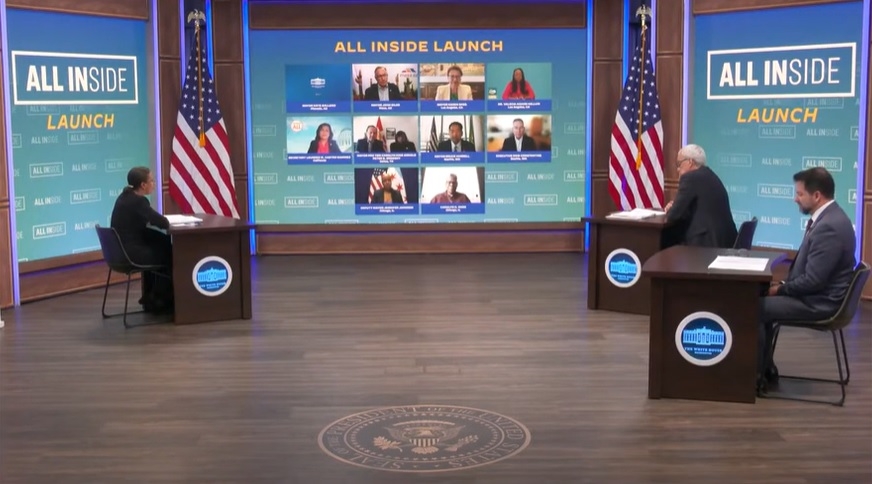What Is the ALL INside Initiative?
ALL INside is a first-of-its kind initiative to address unsheltered homelessness across the country. On May 18, 2023, federal, state, and local leaders came together to launch ALL INside, including Ambassador Susan Rice, the president’s domestic policy advisor; Veterans Affairs Secretary Denis McDonough, the chair of USICH; USICH Executive Director Jeff Olivet; and mayors and other elected officials from across the country.
Read the USICH press release.
Read the White House fact sheet.
Watch the launch on YouTube
ALL INside is a key part of All In: The Federal Strategic Plan to Prevent and End Homelessness, which set a bold goal to reduce homelessness 25% by 2025 and ultimately build a country where every person has a safe and affordable home.
Left to Right: Ambassador Susan Rice, the president’s domestic policy advisor; Veterans Affairs Secretary Denis McDonough, the chair of USICH; and USICH Executive Director Jeff Olivet talk to mayors and other elected officials who virtually joined the launch of ALL INside.
How Does ALL INside Address Unsheltered Homelessness?
The White House, USICH, and the 19 federal agencies that make up our Council are partnering with select state and local governments (see full list of communities below) for up to two years to strengthen and accelerate local efforts to help people move off the streets and into homes where they can recover from the trauma of homelessness and rebuild their lives.
For each of the six communities, the Biden-Harris administration will:
- Embed a dedicated federal official to accelerate locally-driven strategies and enact system-level changes to reduce unsheltered homelessness.
- Deploy dedicated teams across the federal government to identify opportunities for regulatory relief and flexibilities, navigate federal funding streams, and facilitate a peer learning network.
- Launch new efforts to address major barriers to housing, health care, and other support for people experiencing unsheltered homelessness. (Read the USICH press release to learn about federal agency-specific commitments.)
- Convene philanthropy, the private sector, and other communities to identify more opportunities for support and collaboration.
ALL INside Communities
ALL INside in Action
While the work is ongoing, here are some highlights of ALL INside to date:
- The two largest public housing authorities (PHAs) in the Los Angeles area received approval from HUD to allow people additional time to provide documents related to identity, disability status, and income. More specifically, the Housing Authority of the City of Los Angeles and the Los Angeles County Development Authority can now issue vouchers to people experiencing homelessness before completing the verification process. (Typically, PHAs can only issue vouchers after income, identity, and disability status are verified.)
- HUD streamlined the process for PHAs to request flexibilities like those provided to Los Angeles. By showing good cause that flexibilities are needed to serve people experiencing homelessness more effectively, PHAs can receive expedited approval of waivers that allow applicants to self-certify date of birth, disability status, and income.
- HUD approved a first-of-its-kind waiver for Dallas to allow local providers of permanent supportive housing funded by HUD’s special unsheltered grants to leverage behavioral health resources with HUD Continuum of Care funding to provide Housing First Assertive Community Treatment and Intensive Case Management to people transitioning from homelessness to permanent housing.
- Phoenix received first-of-its kind funding from HHS’ Substance Abuse and Mental Health Services Administration to provide comprehensive and integrated behavioral and HIV/AIDS health care for medically underserved people experiencing unsheltered homelessness. Since February, it has provided care to 150 people.
- In Chicago, 59 people have been diverted to shelter, where they await permanent housing, after living in transit stations.
- Dallas' Continuum of Care established a "homelessness preference" to provide 100 housing vouchers a year specifically for people experiencing homelessness.
- The city of Dallas created a new procurement process for permanent supportive housing, which will result in more than 50 additional units of permanent supportive housing for people experiencing homelessness.
- HHS and HUD launched the Housing and Services Partnership Accelerator to help select states (including Arizona, California, and Washington) leverage Medicaid flexibilities to develop and expand innovative housing-related supports and services for people experiencing or at risk of homelessness who have complex medical needs (e.g., people with disabilities, older adults, people with mental health disorders, and people with substance use disorders).
- Washington state received approval under its Medicaid program to provide additional medical support to people experiencing homelessness, and Seattle partnered with community-based organizations to support implementation of these changes.
- Chicago is improving the application process for project-based housing vouchers and published a two-page guide for homelessness service providers to accessing documents from the U.S. Social Security Administration (SSA).
- Dallas established an agreement with the state driver’s license division to speed up the ID process for people experiencing homelessness and enrolled in a SSA pilot program for virtual appointments for SSA services.
- USICH and the state of California hosted and published an online training to help Californians understand and implement the state's "Housing First" law.
For more on ALL INside, contact USICH Director of National Initiatives Beverley Ebersold.



